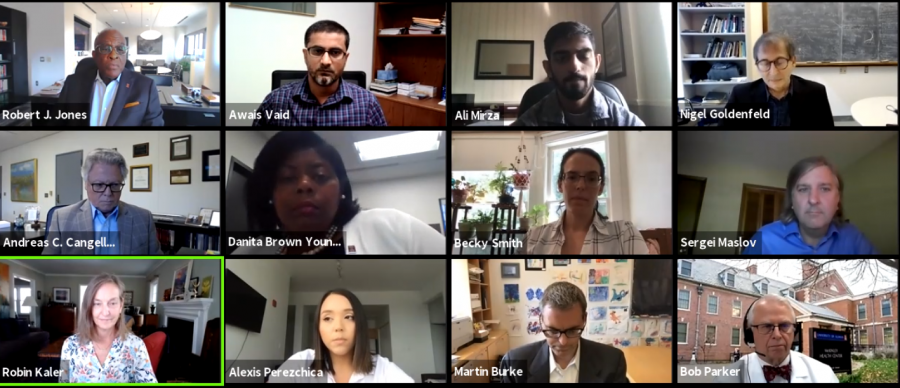University attributes spike in COVID-19 cases to illegal student behavior
University officials, public health officials and student government representatives gathered Wednesday afternoon to discuss the recent spike in on-campus COVID-19 cases.
Sep 2, 2020
Last updated on Sept. 7, 2020 at 03:20 p.m.
University officials and local public health experts gathered in a Zoom call on Wednesday to discuss the spike in on-campus COVID-19 cases, with 334 new cases identified from campus saliva tests on Aug. 30 and 31.
Officials agreed that the recent rise in on-campus COVID-19 cases was because of illegal student behavior.
“We attribute the problem to a number of students participating in large parties and gatherings this past weekend as well as individuals who chose to ignore Champaign-Urbana Public Health District guidance to isolate when they test positive and to quarantine after they’ve been in contact with someone who tested positive,” Jones said.
A level of risky student behavior, and noncompliance with orders, was built into the University’s models for on-campus spread of COVID-19, professor Nigel Goldenfeld said on Wednesday.
Get The Daily Illini in your inbox!
“We do anticipate that students engage in social activities, assume they will go to parties, assume they will go bars, assume they won’t wear masks,” Goldenfeld said. “What’s not in the models is that students would fail to isolate, that they would not respond to efforts to reach them by CUPHD, that they would go to a party even if they knew they were COVID-positive or that they would host a party while they were COVID-positive.”
More than 95% of all the positive cases identified on campus so far are from students, and less than 5% are University employees, said Awais Vaid, deputy administrator of the Champaign-Urbana Public Health District.
Vaid said CUPHD calls students who test positive three times before sending them a certified letter, but a group of students —around 10, Vaid told The News-Gazette — have not been responding to calls.
“We did not anticipate students would knowingly and willfully avoid CUPHD,” said Martin Burke, a University professor who helped create the saliva test.
The University is working with CUPHD to form SHIELD team 30, which will “work to more quickly identify and contact students who have tested positive or have come in contact with someone who has tested positive,” he said.
Chancellor Jones responded to criticism that the University is overstepping its public health responsibility to the Champaign-Urbana community.
“This is the furthest thing away from an experiment that one could imagine,” Chancellor Jones said, bringing up the wealth of testing the University has been able to produce and administer thousands of times a day.
Professor Martin Burke said the situation in Champaign County was “fantastic” prior to students returning to campus, with the test positivity rate temporarily dropping from 1.5% to 0.2%, but a few students have pushed the University’s planned “bump” in cases far higher than hoped.
“The problem is the math is brutal,” Burke said. “That a small number of students can cause an extraordinary level of damage if they choose to willfully break the law. And the students, the ones who are doing the right thing, are the biggest advocates for them being held accountable. Okay, we’re all in this together. And if you can’t obey the law, then you need to go home.”
As of Wednesday, two students had been suspended for violating COVID-related policies, and over 100 more faced investigations. One fraternity, Pi Kappa Phi, was been put on interim suspension for hosting a large party over the weekend.
One of the suspended students had faked the display of the Safer Illinois app.
There have been documented cases of COVID-positive students breaking isolation and swiping their i-cards at testing sites, hoping for a negative result, Burke said.






